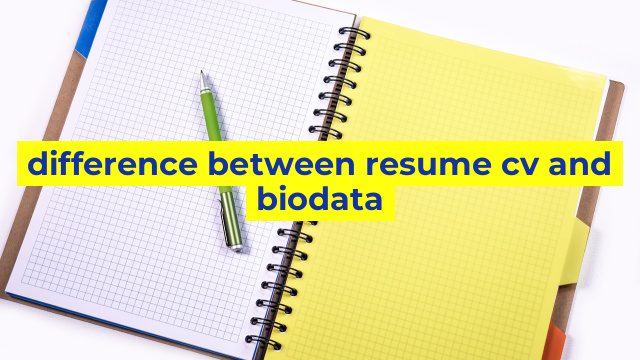Difference Between Resume, CV and Biodata
In the quest for job opportunities, applicants often find themselves dealing with different types of documents. Three of the most commonly used documents are a resume, a CV, and biodata. While all of these are used to showcase one’s qualifications and experience, they differ in their format, contents, and purpose.
Resume
A resume is a document that summarizes an individual’s education, work experience, skills, and achievements related to a particular job opening. It usually does not exceed two pages and is often tailored to fit the requirements of a specific job position. The content is presented in a reverse chronological order, starting with the most recent experience. A resume is often used to apply for jobs in the private sector, in industries such as IT, finance, marketing, and customer service.
CV
A CV, short for Curriculum Vitae, is an exhaustive document that outlines an individual’s academic qualifications, research, teaching experience, publications, and other relevant achievements. It is a comprehensive record of an academic or professional career and can be multiple pages long. CVs are commonly used in academia, research, and science-related fields, and job applications in Europe, Asia, and Africa.
Biodata
Biodata is a document that summarizes an individual’s personal details, including name, address, age, gender, education, occupation, and family background. It is commonly used in India and other South Asian countries instead of a traditional resume or CV. Biodata is often accompanied by a passport-sized photograph and details about the applicant’s hobbies, interests, and other personal information.
Conclusion
To sum up, while all of these documents aim to showcase an individual’s qualifications and achievements, they differ in their format, content, and purpose. A resume is a concise document tailored to a specific job opening, a CV is a comprehensive record of academic or professional achievements, and biodata is a summary of personal information used mainly in South Asian countries. It is important to understand these differences to choose the right document for a particular job opportunity.
Table difference between resume cv and biodata
| Resume | CV | Biodata | |
|---|---|---|---|
| Purpose | Highlighting work experience and qualifications to secure a job position | Comprehensive summary of academic and professional qualifications, research and teaching experience | Personal information, family details, educational background, and other details about a person |
| Length | 1-2 pages | 2-10 pages | 1-2 pages |
| Focus | Skills and accomplishments relevant to the job | Academic and professional accomplishments pertaining to the field | Personal and educational details, knowledge and skills in different fields |
| Chronology | Reverse chronological order | Chronologic or reverse chronological order | Not important |
| Sections | Objective, work experience, education, skills, accomplishments | Academic background, research experience, publications, presentations, awards and honors, and professional experiences | Personal information, educational background, work experience, skills, hobbies, interests, marital status, and other details |


